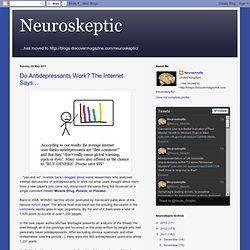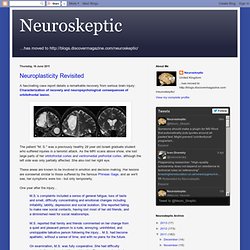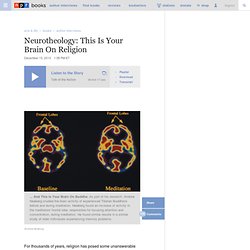

Collections: Psychology. Introduction to Psychology: Lecture 7 – Conscious of the Present; Conscious of the Past: Language (cont.); Vision and Memory (video online lecture + transcript) TIP: The Theories. Welcome to PhilSci-Archive - PhilSci-Archive. The drugs don’t work. Or do they. Across the developing world there is an explosion in the use of drugs to treat mental illness.

But is there really an increase in mental ill health and do these drugs work? These are huge issues with implications for how we view modern society, for public health, for state spending and for our trust in pharmaceutical firms, some of which are amongst the world’s most powerful global corporations. On the grounds of fairness I have to declare a personal interest. In response to my general tendency towards gloominess and low level anxiety I did try out one drug myself. It didn’t work but I’m not suggesting this is of any relevance (it may have been the wrong drug for me and perhaps I didn’t stick with it long enough). If the issue interests you then you really must read this article from the current New York Review of Books. Despite the growth in diagnosis and treatment, there is no evidence of an underlying increase in mental health morbidity.
The massive power of big pharma Comments. Friday Fun: It's just a lamp. I watched this IKEA commercial in my intro social psych class, and five plus years later, it is still seared into my memory. Take the minute to turn on your volume and watch this commercial, and then after the jump I'll tell you how Spike Jonze used social psychology to render me near tears. Did you feel bad for the lamp? I know I did. It was just sitting there in the rain looking so sad. But, as the guy points out - its just a lamp, it doesn't have feelings! This commercial was playing right into our tendency to personify inanimate objects.
Another basic human need is the need to belong. And its not just lamps and advertising - as a child I treated my stuffed animals as beloved members of the family, and I know a few people (ahem, Anna, ahem) who have named their cars and see them a having a distinct personality. Did you feel bad for that little red lamp? The article: Delbaere, M., McQuarrie, E., & Phillips, B. (2011). Do Antidepressants Work? The Internet Says... ...

"yes and no". A while back I blogged about some researchers who analysed internet discussions of antidepressants to work out what users thought about them. Now a new paper's just come out, doing much the same thing but focussed on a single comment thread: Miracle Drug, Poison, or Placebo. Back in 2008, MSNBC ran this article, prompted by the recent publication of the famous Kirsch paper. The article itself was short but the ensuing discussion in the comments rapidly grew to epic proportions. In the new paper, author Michael Montagne presents an analysis of the thread. He first looked to see how many people thought antidepressants were "miracle drugs, poisons, or placebos", which was the title of the original article. Users employed a range of metaphors to describe the experience. 45 people described them as "livesaving" and 8 said they were a "Godsend".
Montagne M (2011). Neuroplasticity Revisited. A fascinating case report details a remarkable recovery from serious brain injury: Characterization of recovery and neuropsychological consequences of orbitofrontal lesion.

The patient "M. S. " was a previously healthy 29 year old Israeli graduate student who suffered injuries in a terrorist attack. As the MRI scans above show, she lost large parts of her orbitofrontal cortex and ventromedial prefrontal cortex, although the left side was only partially affected. She also lost her right eye. These areas are known to be involved in emotion and decision making. One year after the injury... M.S.’s complaints included a sense of general fatigue, loss of taste and smell, difficulty concentrating and emotional changes including irritability, lability, depression and social isolation.
Neurotheology: This Is Your Brain On Religion. Principles of NeurotheologyBy Andrew B.

NewbergPaperback, 284 pagesAshgateList price: $29.95 "Neurotheology" is a unique field of scholarship and investigation that seeks to understand the relationship specifically between the brain and theology, and more broadly between the mind and religion. As a topic, neurotheology has garnered substantial attention in the academic and lay communities in recent years. Several books have been written addressing the relationship between the brain and religious experience and numerous scholarly articles have been published on the topic. The scientific and religious communities have been very interested in obtaining more information regarding neurotheology, how to approach this topic, and whether science and religion can be integrated in some manner that preserves, and perhaps enhances, both. In short, for neurotheology to be successful, science must be kept rigorous and religion must be kept religious. 1. 2. 3. 4. PsycINFO® Australian Psychological Society : APS Homepage.